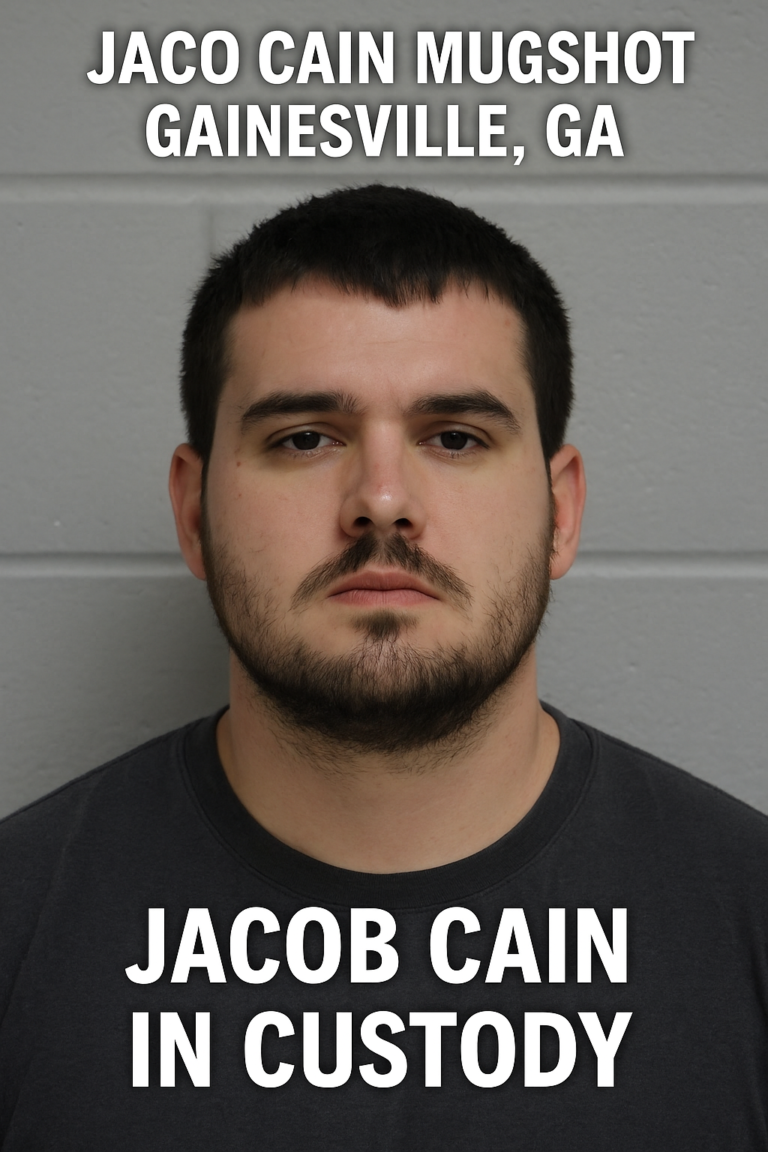In a recent development that has stirred attention in Gainesville, Georgia, Jacob Cain has found himself at the center of a legal storm. The release of his mugshot has prompted discussions across local news platforms and social media alike. The case, while still under investigation, has brought many questions to light regarding the circumstances of his arrest, the charges involved, and what comes next in the judicial process.
Who Is Jacob Cain?
Jacob Cain is a local resident of Gainesville, GA. Until recently, he lived a relatively private life, with no public controversies or legal issues associated with his name. Known by some as a quiet individual, Cain’s sudden appearance in police custody shocked those who knew him personally or through community connections.
Although not a public figure, his arrest has drawn considerable media interest, partly due to the unexpected nature of the incident and the unclear details surrounding it. As of now, limited personal information has been released, pending further developments in the case.
Details of the Arrest
Jacob Cain was taken into custody earlier this week by Gainesville Police Department officers. The arrest was part of an ongoing investigation, though authorities have yet to confirm whether Cain was apprehended at his residence, a public area, or another location.
According to initial reports, Cain was cooperative during the arrest process. Law enforcement officials have maintained that the arrest was conducted without incident, and no forceful measures were required. The arresting officers have not released a full report, but sources close to the matter indicate that Cain was transported to the Hall County Detention Center shortly after his arrest.
Charges Filed Against Him
As of the latest update, specific charges against Jacob Cain have not been publicly disclosed in full. However, local sources suggest that the arrest may be related to a criminal investigation involving either property-related offenses or a potential breach of public safety regulations.
The police have stated that the case is still under active review, and additional details will be released once formal charges are filed in court. It remains unclear whether this is Cain’s first encounter with the law or part of a larger legal matter involving other individuals.
Release of the Mugshot
The mugshot of Jacob Cain was officially released following his booking at the Hall County Detention Center. The image quickly circulated online, appearing on local news websites and public arrest record databases.
Public reactions to the mugshot have been mixed. Some residents expressed concern and curiosity, while others questioned whether sharing such images without full context is ethical. Nonetheless, the release of the photo is consistent with Georgia’s legal procedures, which allow mugshots to be made publicly available once an individual is booked into custody.
Public and Media Reaction
News of Jacob Cain’s arrest has spread rapidly throughout the Gainesville community. Local media outlets were quick to cover the story, particularly after the mugshot became available. Community social media pages saw a spike in discussion, with many speculating about the reason behind Cain’s arrest and expressing surprise at the incident.
Despite the buzz, some residents have called for restraint in judgment. “It’s important to wait for the facts before jumping to conclusions,” said one commenter on a local Facebook group. Others echoed similar sentiments, urging the public to avoid rushing to condemn someone before the legal process is complete.
Legal Implications and Next Steps
Following the arrest, Jacob Cain is expected to appear before a judge for an initial hearing. During this session, charges will be formally presented, and bail may be discussed depending on the severity of the allegations. If the case proceeds, Cain will have the opportunity to secure legal representation and prepare a defense.
Georgia law ensures that individuals accused of crimes are considered innocent until proven guilty in a court of law. Therefore, Cain’s current legal status is that of a suspect, not a convicted criminal. His defense team, once confirmed, will likely push for transparency and fairness throughout the proceedings.
Privacy Concerns and Community Awareness
The public release of mugshots in Georgia has been a topic of debate for years. While the practice is legal, it often raises questions about privacy and the long-term impact on individuals who are later found innocent or have charges dropped.
In Jacob Cain’s case, the quick spread of his photo and name across digital platforms may have lasting consequences, regardless of the outcome of the case. Community leaders have expressed concern over the balance between public right-to-know and individual rights to privacy.
Law Enforcement’s Position
The Gainesville Police Department has remained professional in its handling of the situation. In a brief public statement, a department spokesperson confirmed the arrest and assured the public that proper procedures were followed. The spokesperson also emphasized that updates will be provided as the investigation progresses.
Law enforcement agencies are bound by protocol when dealing with suspects, and in this case, officials have not released unnecessary or speculative information. Their measured approach aims to avoid influencing public opinion before a fair trial is held.
Awaiting Justice
As of now, Jacob Cain remains in custody or under legal supervision, depending on whether bail was granted. The investigation is ongoing, and new details may emerge in the coming days or weeks. Legal experts suggest that a full picture of the case will not be available until court proceedings begin.
The case serves as a reminder of how quickly an individual can become a public figure under unfortunate circumstances. It also highlights the importance of due process, responsible journalism, and cautious public commentary.
Conclusion
The story of Jacob Cain’s arrest in Gainesville, GA, and the release of his mugshot presents a complex intersection of law enforcement, media, and public response. While much remains unknown, the situation has sparked essential conversations about justice, privacy, and the role of information in shaping opinions.

